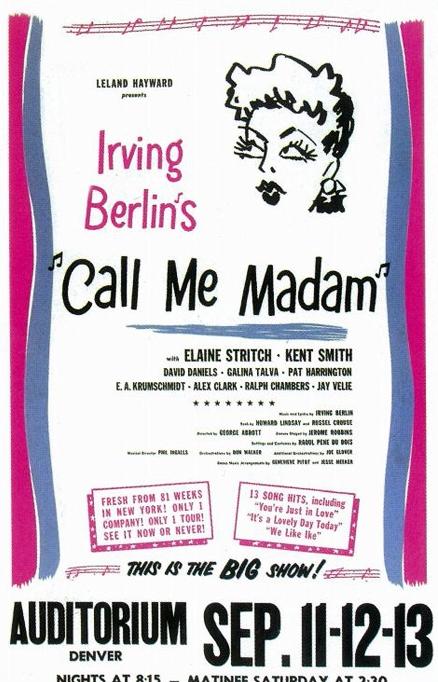Call Me Madam
Musical (1950)
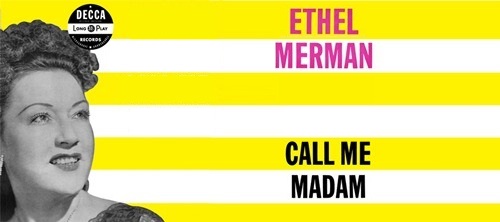
The lead character is based on Washington, D.C. hostess and Democratic Party fundraiser Perle Mesta, who was appointed the Ambassador to Luxembourg in 1949. The Playbill distributed at each performance humorously noted that "neither the character of Mrs. Sally Adams nor Miss Ethel Merman resemble any person living or dead."
In 1949, Merman and her family were vacationing at the Hotel Colorado in Glenwood Springs with Howard Lindsay and his wife Dorothy Stickney. Watching Merman poolside while reading a magazine article about Mesta, Lindsay was struck by how typically "American" she was and immediately envisioned her portraying a colorful character similar to the newly appointed ambassador. When he proposed the idea to Merman, who had little interest in either society or political news, she responded, "Who's Perle Mesta?"
Although Merman had announced she was interested in playing a dramatic role in her next project, Lindsay and Russel Crouse approached Irving Berlin and began working on the book for Call Me Madam when he expressed interest in composing the score. Berlin's last production, Miss Liberty, had failed to recoup its investment, and he was determined to repeat the success he had had with Annie Get Your Gun. The three collaborators agreed they needed to treat their subject with care to avoid any legal action by Mesta. As the work progressed, Merman conceded she would be willing to sing two or three songs, but eventually accepted the fact she was going to star in a full-scale musical comedy instead of the drama she preferred.
Producer Leland Hayward budgeted the production at $250,000. In exchange for the original cast recording and television broadcast rights, he arranged to have it financed 100% by RCA Records and NBC, with the two sharing 35% of the net earnings. In order to increase the profits, Hayward decided to charge an all-time high of $7.20 for orchestra seats.
Hayward hired George Abbott to direct, and Abbott and casting director Harold Prince auditioned thousands of actors for the twenty speaking roles and twenty-nine chorus members. Raoul Pene du Bois was hired to design sets and costumes, although the wardrobe worn by Merman was the responsibility of Mainbocher.
Once the script was completed, everyone agreed that while it was little more than standard situation comedy material it was a perfect vehicle for Merman, and that Berlin's score, although far from his best, was tuneful and memorable. It included the comic song "Mr. Monotony", which originally was written for and dropped from the film Easter Parade. Berlin had then included it in Miss Liberty, but it was dropped from that as well. In this instance, the third time was not the charm; during out-of-town tryouts, Merman insisted it be dropped. (In 1989, Sarah Brightman recorded it for her CD The Songs That Got Away.) To fill the hole its omission left in the second act, Berlin wrote "Something to Dance About" to give the second act a lively opening. When the star requested a duet with Russell Nype playing her lovestruck press attache Berlin responded by writing the counterpoint tune "You're Just in Love" and it ultimately became a showstopper at every performance.
Directed by George Abbott and choreographed by Jerome Robbins, the musical premiered at the Shubert Theatre in New Haven, Connecticut on September 11, 1950. Reviews were mixed - Variety said it "inspires warm applause rather than cheer"—and Berlin wrote two new songs to bolster the sagging second act. It opened in Boston on September 19, and while The Boston Record thought it offered "only an occasional flash of inspirational fire", it played to standing-room-only audiences throughout the run.
With a record advance sale of $2 million, the Broadway production opened on October 12 at the Imperial Theatre, where it ran for 644 performances and grossed more than $4 million. In addition to Merman and Nype, the cast included Paul Lukas, Pat Harrington, Sr., Lilia Skala, and Richard Eastham. Brooks Atkinson of The New York Times thought it offered one of Berlin's "most enchanting scores: fresh, light, and beguiling, and fitted to lyrics that fall out of it with grace and humor", and the New York Post called Merman "indescribably soul-satisfying", "a comedienne of rare skill", and "one of the joys of the world." She remained with the show for the entire run and appeared in the limited four-week engagement staged to celebrate the reopening of the National Theatre in Washington, D.C., but her understudy Elaine Stritch starred in the national tour.
The musical opened in the West End at the London Coliseum on March 15, 1952 where it ran for 486 performances and starred Billie Worth.
The New York City Center Encores! semi-staged concert version starring Tyne Daly was presented in February 1995.[3] A regional production ran at the Paper Mill Playhouse, Millburn, New Jersey, in April–May 1996 and starred Leslie Uggams.
Sally Adams becomes Ambassador of Lichtenburg and charms Cosmo Constanstine with her undiplomatic manner. Meanwhile, her press attache, Keneth Gibson, falls in love with Princess Maria.
Afficher le synopsis détaillé
Sally Adams, Washington's "hostess with the mostes'," is named Ambassador to the Grand Duchy of Lichtenburg - a tiny kingdom steeped in royal custom and rapidly changing coalition governments. Kenneth Gibson, an eager young diplomat, is assigned to be her aide. True to her almost total disrespect for protocol, Sally arrives late in Lichtenburg. There she encounters foreign minister Cosmo Constantine, not, however, to the degree her romantic nature would like. Worse yet, Cosmo refuses American foreign aid. Sally gets talked into a scheme to get Cosmo elevated to Prime Minister to make way for a new foreign minister eager to accept American money to "save" the country.
When the loan is all but consummated, Cosmo finds out about it and resigns. This ruins all possibilities for another coalition, and the country must hold its first general election in twenty years. Sally openly campaigns for Cosmo, forcing her recall to Washington for becoming involved in another government's internal affairs. Kenneth, too, commits a grave diplomatic error by falling in love with the Princess Maria and arranging secret meetings with her. However, a spirit of democracy is over Lichtenburg. The princess is granted permission to ask Kenneth to marry her. Elected Prime Minister, Cosmo visits Sally in Washington to grant her the royal order of Dame and revive their "acquaintance."
Acte I
Overture - Orchestra
Mrs. Sally Adams - The Company
Hostess with the Mostes' on the Ball, The - Sally
Washington Square Dance - Sally & Company
Lichtenburg - Cosmo & Singers
Can You Use Any Money Today? - Sally
Marrying for Love - Cosmo & Sally
Ocarina, The - Princess Maria, Dancers, 'Potato Bug' & Company
It's a Lovely Day Today - Kenneth & Princess Maria
It's a Lovely Day Today (reprise) - Kenneth, Dancers & Company
Best Thing for You, The - Sally & Cosmo
Acte II
Entracte - Orchestra
Lichtenburg (reprise) - Cosmo & Singers
Something to Dance About - Sally, Principal Dancers & Company
Once Upon a Time Today - Kenneth
They Like Ike - Congressman Wilkins, Senator Gallagher & Senator Brockbank
You're Just in Love - Sally & Kenneth
Best Thing for You, The (reprise) - Sally & Cosmo
It's a Lovely Day Today (reprise) - Kenneth & Princess Marie
Mrs. Sally Adams (reprise) - The Company
Finale - The Company & Sally
Aucun dossier informatif complémentaire concernant Call Me Madam
Aucun dossier informatif complémentaire concernant Call Me Madam

Version 1
Call Me Madam (1950-09-Shubert Theatre-Boston)
Type de série: Pre-Broadway Try OutThéâtre: Shubert Theatre (Boston - Etats-Unis) Durée : Nombre : Première Preview : Inconnu
Première: 19 September 1950
Dernière: InconnuMise en scène : George Abbott • Chorégraphie : Jerome Robbins • Producteur : Star(s) : Avec: Mrs. Sally Adams … Ethel Merman
Cosmo Constantine … Paul Lukas
Kenneth Gibson … Russell Nype
Princess Maria ... Galina Talva
Congressman Wilkins ... Pat Harrington
Pemberton Maxwell ... Alan Hewitt
Senator Gallagher ... Ralph Chambers
Hugo Tantinnin ... E. A. Krumschmidt
Sebastian Sabastian ... Henry Lascoe
The Secretary of State ... Geoffrey Lumb
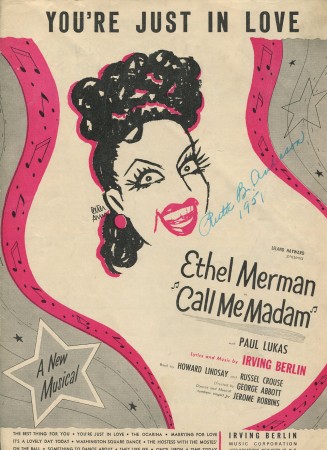
Version 2
Call Me Madam (1950-10-Imperial Theatre-Broadway)
Type de série: OriginalThéâtre: Imperial Theatre (Broadway - Etats-Unis) Durée : 1 an 5 mois Nombre : 644 représentationsPremière Preview : Inconnu
Première: 12 October 1950
Dernière: 15 March 1952Mise en scène : George Abbott • Chorégraphie : Jerome Robbins • Producteur : Star(s) : Avec: Mrs. Sally Adams … Ethel Merman
Cosmo Constantine … Paul Lukas
Kenneth Gibson … Russell Nype
Princess Maria ... Galina Talva
Congressman Wilkins ... Pat Harrington
Pemberton Maxwell ... Alan Hewitt
Senator Gallagher ... Ralph Chambers
Hugo Tantinnin ... E. A. Krumschmidt
Sebastian Sabastian ... Henry Lascoe
The Secretary of State ... Geoffrey Lumb
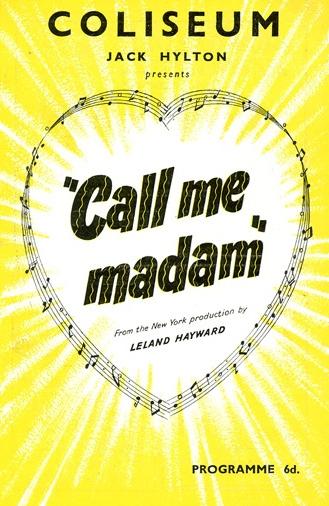
Version 4
Call Me Madam (1952-03-London Coliseum Theatre-London)
Type de série: Original LondonThéâtre: Coliseum Theatre (Londres - Angleterre) Durée : Nombre : 486 représentationsPremière Preview : Inconnu
Première: 15 March 1952
Dernière: InconnuMise en scène : Richard Bird • Chorégraphie : George Carden • Producteur : Star(s) : Avec: Mrs. Sally Adams ... Billie Worth
The Secretary of State ... Robert Henderson
Supreme Court Justice ... Mayne Lynton
Congressman Wilkins ... Sidney Keith
Henry Gibson ... David Storm
Kenneth Gibson ... Jeff Warren
Senator Gallagher ... Launce Maraschel
Secretary To Mrs. Adams ... Mary Dean
Butler ... Richard Courtney
Senator Brockbank ... Arthur Lowe
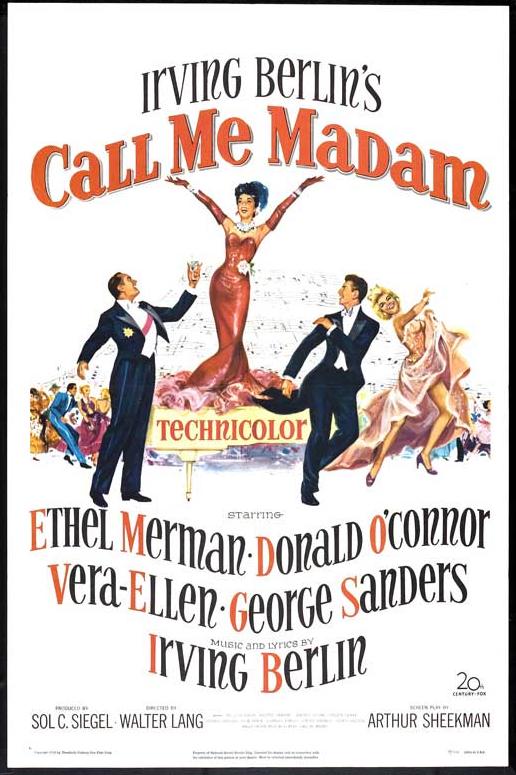
Version 5
Call Me Madam (1953-04-Film)
Type de série: FilmThéâtre: *** Film (*** - ***) Durée : Nombre : Première Preview : Inconnu
Première: Inconnu
Dernière: InconnuMise en scène : Walter Lang • Chorégraphie : Producteur : Star(s) : Commentaires longs: Merman won the Golden Globe for Best Actress in a Musical or Comedy. Alfred Newman won the Academy Award for Best Scoring of a Musical Picture, and Irene Sharaff was nominated for her costume design. Lang was nominated for Outstanding Directorial Achievement in Motion Pictures by the Directors Guild of America and the Grand Prize at the 1953 Cannes Film Festival, and Sheekman's screenplay was nominated Best Written American Musical by the Writers Guild of America.
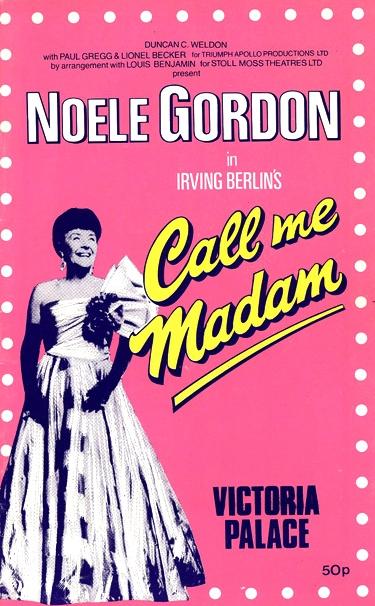
Version 6
Call Me Madam (1983-05-Victoria Palace Theatre-Londres)
Type de série: RevivalThéâtre: Victoria Palace Theatre (Londres - Angleterre) Durée : 2 mois Nombre : Première Preview : Inconnu
Première: 14 March 1983
Dernière: 14 May 1983Mise en scène : Roger Redfarn • Chorégraphie : Tudor Davies • Producteur : Star(s) : Avec: Noele Gordon (Sally Adams), Basil Hoskins (Cosmo), William Relton (Ken Gibson), Veronica Page (Princess Maria), Christopher Marlowe, David Alder, Bruce Morrison
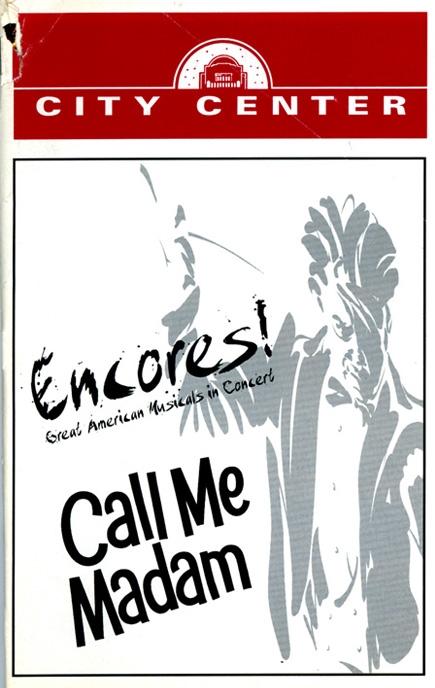
Version 7
Call Me Madam (1995-02-New York City Center-New York) Encores! Concert
Type de série: ConcertThéâtre: New York City Center (Broadway - Etats-Unis) Durée : Nombre : 5 représentationsPremière Preview : Inconnu
Première: 16 February 1995
Dernière: 18 February 1995Mise en scène : Chorégraphie : Kathleen Marshall • Producteur : Star(s) : Avec: Mrs. Sally Adams ... Tyne Daly
Mr. Gibson ... John Leslie Wolfe
Congressman Wilkins ... Christopher Durang
Kenneth Gibson ... Lewis Cleale
Senator Brockbank ... MacIntyre Dixon
Senator Gallagher ... Ken Page
Cosmo Constantine ... Walter Charles
Pemberton Maxwell ... Peter Bartlett
Sebastian Sabastian ... Simon Jones
Princess Maria ... Melissa Errico
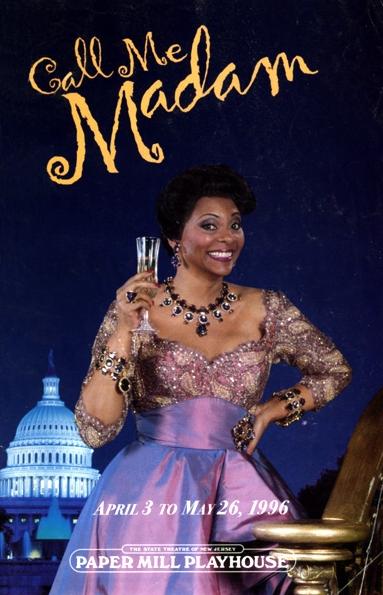
Version 8
Call Me Madam (1996-04-Paper Mill Playhouse-Milburn)
Type de série: RevivalThéâtre: Paper Mill Playhouse (Milburn - Etats-Unis) Durée : 1 mois 3 semaines Nombre : Première Preview : Inconnu
Première: 03 April 1996
Dernière: 26 May 1996Mise en scène : Charles Repole • Chorégraphie : Daniel Stewart • Producteur : Star(s) : Avec: Mrs. Sally Adams ... Leslie Uggams
Senator Gallagher ... Michael James Leslie
Senator Brockbank ... Hal Robinson
Congressman Wilkins ... MichaelJohn McGann
Henry Gibson ... J.B. Adams
Kenneth Gibson ... Jonathan Hadley
Secretary ... Nancy Johnston
Cosmo Constantine ... Neal Benari
Pemberton Maxwell ... Mark Baker
Clerk ... Dan LoBuono
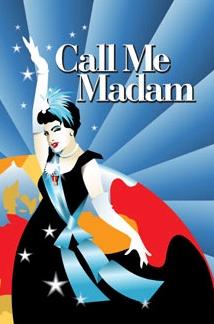
Version 9
Call Me Madam (2004-05-Goodspeed Opera House-East Haddam)
Type de série:Théâtre: Goodspeed Opera House (East Haddam - Etats-Unis) Durée : 1 mois 2 semaines Nombre : Première Preview : 16 April 2004
Première: 19 May 2004
Dernière: 03 July 2004Mise en scène : James Brennan • Chorégraphie : James Brennan • Producteur : Star(s) : Avec: Mrs. Sally Adams … Kim Criswell
Princess Maria … Catherine Brunell
Kenneth Gibson … Zachary Halley
Cosmo Constantine … David Hess
Pemberton Maxwell … Stephen Temperley
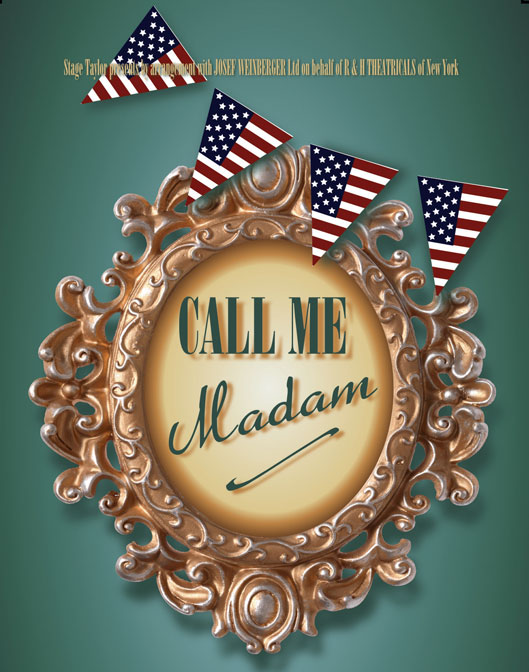
Version 10
Call Me Madam (2009-07-Upstairs at the Gatehouse-London)
Type de série: RevivalThéâtre: Upstairs at the Gatehouse (Londres - Angleterre) Durée : 1 mois Nombre : Première Preview : 11 July 2009
Première: 14 July 2009
Dernière: 16 August 2009Mise en scène : Thom Southerland • Chorégraphie : Drew McOnie • Producteur : Star(s) : Avec: Beverley Klein (Sally Adams) , Gido Schimanski (Cosmo), Chris Love (Ken Gibson), Kate Nelson (Princess Maria ), Matthew Trevannion, Rob Wilshaw, Chris NeumannPresse : MICHAEL BILLINGTON for THE GUARDIAN says, "Implausible and unnecessary musical...I wouldn't have minded a few tuneful Mediterranean ditties here in place of the instantly forgettable two dozen numbers by John Robinson that fatally clog the action."
DOMINIC MAXWELL for THE TIMES says, "Too Close to the Sun is pretty dire. But it’s such a muted, muddled experience, such a waste of time and talent, that there’s not really much to snigger about...It’s not good; it’s not so bad it’s good. It’s just bewilderingly drab."
RHODA KOEING for THE INDEPENDENT says, "Stilted production...Robinson's trite music pootles about aimlessly and tunelessly, and the lyrics (a Robinson-Trippini collaboration) eschew rhyme as well as reason."
CHARLES SPENCER for THE DAILY TELEGRAPH says, "Of more than 20 musical numbers, there isn’t one that either delights or lodges itself in the memory...Pat Garrett’s production plods through this rubbish heap of a show with leaden tedium."
FIONA MOUNTFORD for THE EVENING STANDARD says, "The dialogue is flat and the music peculiar, with song after identical song coming over all difficult and resolutely tune-free. "
Pas encore de video disponible pour ce spectacle
